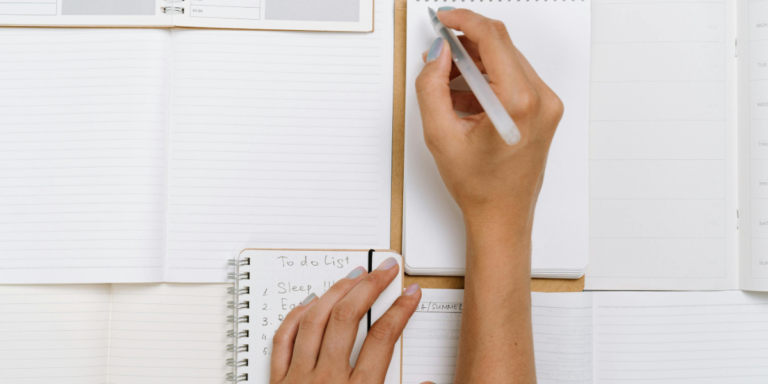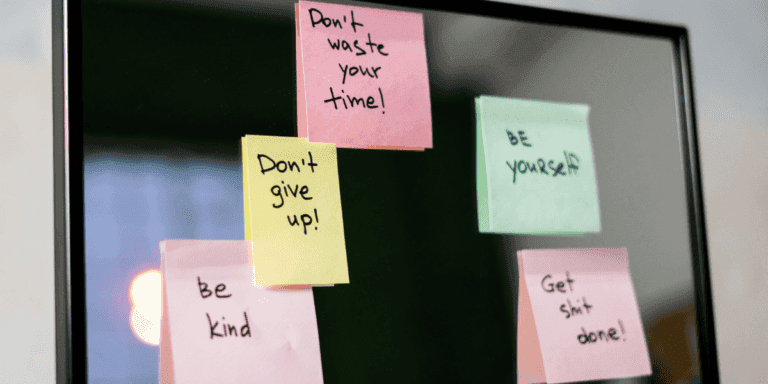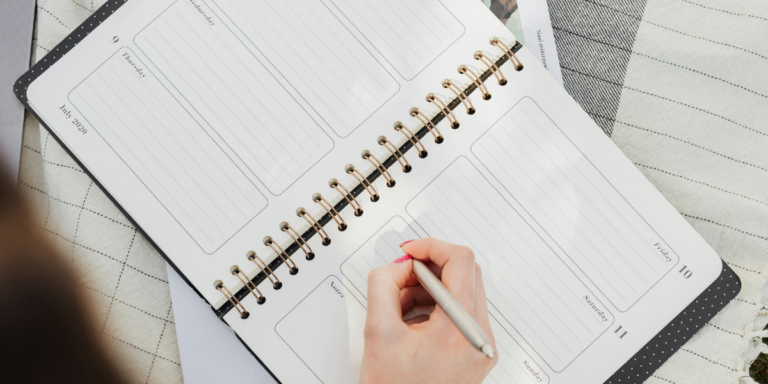Knowing what your energy givers and energy takers are is an important step in managing your personal energy and productivity.
As a Mindset and Productivity Coach for perfectionists, I am always preaching to my clients about finding a balance with their energy levels and setting realistic goals within their capacity.
For some reason, perfectionists seem to struggle with this A LOT. As a recovering perfectionist, I had to learn the hard way how to limit energy takers and increase the number of energy givers in my daily routine so that I could get things done without burning out.
Read on to find out the exact process I use to identify the activities that boost my energy and make me feel good and the ones that suck the soul out of my life.
This page might contain affiliate links. In the event of a sale, I will be awarded a small commission (at no extra cost to you).
What is energy management?
Energy management is a holistic approach to productivity and involves managing your mental, emotional, and physical energy so that you can find flow in your work and life.
To effectively manage your energy you need to be self-aware enough to know what is working for you and what is working against you and it sounds a lot easier said than done.
For example, after completing an audit of my life and values, I realised that spending time on social media for my business was draining my energy rapidly so I made changes to my business model so that I didn’t need to rely on social media as much.
Basically, what I’m trying to say is that energy management is very personal and something that drains me might boost your energy so it’s all about working WITH yourself not against yourself.
Why is it important?
There are many reasons why energy management is important for you to incorporate into your routine. For example,
- Your productivity levels will increase because you’ll be able to focus on activities that increase your energy and limit or take breaks more regularly for tasks that drain you
- Your overall wellbeing will improve because you will stop going through cycles of go-go-go and burnout (something that perfectionists often struggle with!).
- You’ll be able to enjoy your self-care practices without feeling guilty because it is so embedded into your routine
- You will feel more emotionally regulated and better able to handle stressful situations
- Even your decision-making ability will improve because your mind will be working in optimal rather than depleted and overworked conditions

What is the difference between energy givers and energy takers?
In simple terms, an energy giver is anything that boosts your energy and makes you feel motivated, positive, passionate, recharged and ready to go.
Whereas, an energy taker is anything that drains your energy and leaves you feeling tired, stressed, negative, frustrated, upset and causes you to procrastinate.
How do you identify energy givers?
Energy givers are very easy to identify because you will most likely finish the activity feeling recharged and excited for the next time you get to experience that activity.
To create a concrete list of your energy givers, I recommend you ask yourself these things:
- Reflect on your daily activities, interactions and routines. Which activities or people leave you feeling refreshed and motivated?
- What time of day do you feel most energised?
- What are you doing when you feel most energised?
- Keep a mood and energy tracker. Pay attention to the fluctuations in your mood and energy depending on your day
- Ask your friends and family if they notice a difference in your energy after certain activities.
Examples of energy givers in the 8 areas of life
Personal and spiritual
- Practising mindfulness or meditation
- Learning something new that excites you
- Developing habits that enable you to pursue your goals
- Reading inspiring books/audiobooks
- Journaling
- Attending workshops
- Listening to podcasts that motivate you
- Going for a walk through the park
Health and Fitness
- Getting enough sleep every day
- Maintaining a regular gym routine
- Trying a new yoga class
- Eating healthy meals
- Learning how to swim
- Trying a new recipe
- Having a long bubble bath
Friends and family
- Spending time with a supportive friend
- Encouraging your friends and family to pursue their goals
- Receiving hugs from the people you care about
- Having deep conversations
- Reaching out to friends you haven’t heard from in a while
- Reminiscing about old photographs
Career and business
- Finding work-life flow
- Setting boundaries at work
- Working on projects that make a difference in the world
- Receiving recognition for your work
- Mentoring your coworkers
- Learning a new professional skill
- Asking your coworker for a coffee chat
Romantic relationships
- Communicating your needs with your loved one
- Spending quality time together
- Planning a date night
- Identifying each other’s love maps
- Celebrating anniversaries
- Playing silly games with each other
Financial health
- Paying off your debts
- Living life within your means without worrying about money
- Saving money for a holiday
- Creating a financial plan that aligns with your goals and values
- Learning how to invest
Fun and recreation
- Going to the cinema with your friends
- Hosting a regular games night
- Trying a new hobby
- Learning how to play an instrument
- Trying a new route to work
- Going on holiday
- Going on a weekend staycation
Physical environment/home life
- Maintaining a clean and tidy home
- Keeping things organised
- Having a space just for relaxation
- Decluttering your old items
- Adding your favourite designs to your home
- Watering your house plants so they live a long life
How do you identify energy takers?
Identifying energy takers can be quite tricky because so many of them are ingrained in our daily routines which is why self-awareness is key.
I recommend you keep a journal and/or energy tracker to help you identify your energy takers:
- Reflect on your daily activities, interactions and routines. Ask yourself which activities leave you feeling drained or in a bad mood
- Notice the times of day when you feel most drained and reflect on what you are doing at those times
- Are there people in your life who always leave you in a bad mood?
- Ask your friends and family for feedback/observations
- What do you spend most of your time doing when you are procrastinating?
- What activities are you subconsciously trying to avoid?
- Pick one thing to detox from for a week (e.g. social media, coffee, junk food etc…) and reflect on how you feel as the week goes on
Examples of energy takers in the 8 areas of life
Personal and spiritual
- Letting your perfectionism hold you back
- Procrastinating and avoiding tasks
- Overworking yourself
- Not practising self-care
- Poor emotional regulation
- Negative self-talk
- Feeling like you have no purpose
- Being out of alignment with your values
Health and Fitness
- Eating junk food regularly
- Living a sedentary life
- Having a poor sleeping pattern
- Comfort eating
- Drinking excessive amounts of coffee
Friends and family
- Spending time with people who are always complaining
- Not setting boundaries with enmeshed family members
- Gossiping with friends
- Being around people who bring the bad side of you out
- Overcommitting to other people
- People-pleasing
Career and business
- A toxic work environment
- Working overtime and not taking breaks
- Unrealistic workloads and high-stress
- A job that you hate
- A career that isn’t aligned with your values
- Lack of recognition
Romantic relationships
- Codependent relationships
- Relationships with insecure attachment styles e.g. the anxious/avoidant trap
- Not going on date nights
- Frequent arguments
- Poor communication
- Silent treatment
Financial health
- Constantly in debt with Clearpay, Klarna and other loans
- Poor budgeting of your money
- Living outside of your means
- Toxic ‘treat yo self’ mentality
- Spending money when feeling emotional
- Avoiding your bank account
Fun and recreation
- Not spending time on any hobbies
- Staying indoors doom-scrolling on Instagram
- Avoiding your friends and family
- Overindulging in hobbies and interests
- Avoiding responsibilities
Physical environment/home life
- Cluttered disorganised home
- Crowded noisy environments
- Not having a space where you can relax
- Not feeling at home in your own home
So now, you may be wondering ‘Am I an energy giver or an energy taker?’
You might be an energy giver if:
- People feel happier after spending time with you
- You love offering help and encouragement when requested
- You focus on the solutions rather than the problems
- You smile often and make others feel included
- You stay calm in stressful situations and don’t escalate things unnecessarily
- You let others speak and don’t interrupt them
- You communicate your problems clearly and with empathy
- You think optimistically about the future
You might be an energy taker if:
- You always complain or criticise
- Conversations are always about you and your problems
- You interrupt conversations
- You break promises frequently
- You judge others
- You are always in drama
- You are passive-aggressive and don’t communicate clearly
- You are a people-pleaser or an avoidant
- You always predict negative outcomes
- People feel exhausted after interacting with you
No one is wholly an energy giver or an energy taker. In fact, we may be both in any one scenario so don’t beat yourself up about your result because having more energy-draining traits doesn’t mean you’re a bad person.
Here are some things you can do to become more energy-giving:
- Apologise to people that you have been complaining to or about
- Forgive yourself for your mistakes
- Identify your energy-taking traits and reflect on your reasons for doing those behaviours
- Talk to a therapist or a life coach
- Journal your thoughts and feelings
- Have a self-care day
- Remove or limit energy-draining activities from your routine
- Increase the number of energy-boosting activities
- Practise non-violent communication scripts to help you deal with conflict
- Learn how to actively listen and not interrupt others
Journal prompts for increasing positive energy
- Who makes me feel like I can do anything and inspires me to be a better person?
- How can I spend more time around people who give me positive energy?
- What self-care practice do I need to add to my routine so that I feel safe and protected?
- What 3 things am I most grateful for today and why?
- Write down 3 positive affirmations for the rest of the day. E.g. I am safe and protected
- What does the ideal version of you do to protect their energy?
- What is something you are really proud about?
- Plan out a self-care day and schedule a day in your calendar
Journal prompts for releasing negative energy
- What is keeping me stuck in my life right now?
- Brain dump all of your frustrations about life on a piece of paper without censoring yourself. Think about how that makes you feel to get it all out of your head
- Write a letter to yourself forgiving yourself for your past mistakes
- Write a negative thought you have recently had and reframe it into a positive or neutral statement
- What 3 energy takers do you need to remove or limit in your life?
- Where do you feel the most tension in your body and what stretch do you need to do to release it?
- Where do you need to set boundaries in your life and how are you going to set these boundaries?
How can you boost energy-giving activities in your life?
Now you know everything about energy-giving and energy-taking activities, people and things so it is up to you how you decide to go about your life.
Taking a proactive role in managing your energy levels is the best thing you can do for your wellbeing and overall productivity. I wouldn’t be where I am in my life right now if I didn’t decide to change my whole approach to life.
I was an energy-draining person for many years because I didn’t know any better but I took tiny steps each day to limit energy takers from my life and increase energy givers which enabled me to become an energy-giving person.
If I can do it, so can you!
Join the community of healing perfectionists
If you would like to receive productivity and self-development tips designed specifically for perfectionists PLUS exclusive coaching offers join my weekly newsletter ‘The Sunday Reset’.
Remember, you are the ONLY person you are going to be with for your whole entire life, so you might as well invest in yourself.
Investing in yourself can be in the form of coaching, courses, reading, journaling, practising self-care and many more things.
Related Posts
- The Truth About Recovery From Severe Burnout
- 5 energy management techniques to elevate your life
- How To Have A Guilt-Free Self-Care Day
- 7 Important Boundaries Perfectionists NEED To Set Without Guilt!
- 123 Affirmations For Growth Mindset and Success
- 5 ridiculously simple ways to practise mindfulness and calm your mind
- How To Make Decisions as a Perfectionist – 10 EASY steps
- How To Deal With Mistakes as a Perfectionist – 9 Simple Ways!






